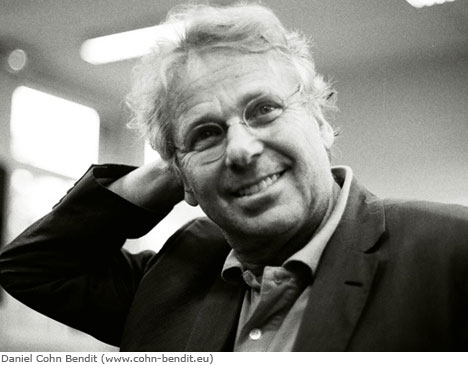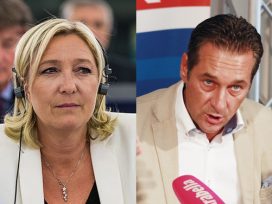Esprit: On several occasions you have criticized the French political system for its excessive “presidentialism”. What form does this take at a time when the sovereign power of governments and the ability of politicians to have any effect on the crisis are being seriously called into question?
Daniel Cohn-Bendit: What we are seeing in the presidential campaigns in France is that the more chance the candidates have of winning – or the more chance they think they have of winning – the more they are prepared to play the game that I call “national presidentialism”. They go in for speeches that amount to saying: “If I’m elected, then everything in France is going to be different because I’m the only one able to lead this country”. In doing so they are attributing all decision-making power to the president and to the majority government that he or she chooses and at the same time removing France from an international context. In presidential campaigns, the question of Europe only rarely comes up and the rest of the world is not mentioned at all. All that matters is how the candidate is going to be able to restore France’s image once he or she has been given supreme power.

This can clearly be seen when you look at the strategies of the various candidates. Nicolas Sarkozy’s strategy is quite clear: getting people to forget his five years as president and hammering home the message that he is the only one who can steer France through the present crisis. It is the opposite of Jospin’s 2002 campaign, when he chose to stake everything on his record.
On the more strictly political level, Nicolas Sarkozy is, in a sense, torn. On the right, if the Front National begins scoring too highly in the polls, the UMP is going to find itself robbed of part of its electorate. So they are going to have to counter the offensive mounted by the FN, which is what the Interior Minister, Claude Guéant is busy doing. However Sarkozy also needs to open up a space in the centre or centre-right to ensure that he gets the votes of those republicans on the right who aren’t or are no longer prepared to accept the current government’s shift to the right.
As for François Hollande, he seems to have adopted the same strategy as the Spanish prime minister Mariano Rajoy in his electoral campaign last year. Where people are voting against the sitting administration, all the opposition candidate has to do is say nothing, so that there’s nothing for which he can be attacked. He doesn’t take up any particular stance. The only thing that Hollande is trying to put across is that he has authority, in order to get people to forget the accusations made by Martine Aubry during the Socialist Party primaries and by the right wing that he is indecisive, weak and incapable of seeing things through. The problem is that he’s refusing to take part in any debates and is trying to demonstrate his authority by coming down hard on the Greens.
Unlike François Hollande, François Bayrou is absolutely sure that he has presidential stature, indeed that he is the only candidate who has it. He has seized the empty space created by the two favourites and, surprising as it may seem, is still riding very high in the polls. He is creating for himself the stature of a De Gaulle, claiming to be the only candidate able to command a majority that will give France a real future in this time of crisis. His capital is his personality and, however much of a paradox it might sound, is helped by what he hasn’t got: he has no party, no assembly members; the last ten years of his political career have been marked by successive defeats. And so he has the mythic status of the man alone, the man who is at no one’s beck and call, the man who cares about nothing but France.
And then there are Jean-Luc Mélenchon, representing the Left Front, and Eva Joly for The Greens. Mélenchon has obviously modelled himself on the communist Georges Marchais, which might attract a certain leftwing fringe among the electorate, depending on the position that François Hollande finds himself in. The same goes for Joly, who is wavering between positions close to those of Mélenchon and a more strictly ecological discourse. However, as we have seen, it is not easy for someone who isn’t a professional politician to personify, all by herself, French political ecology with all its history and all its contradictions.
And finally, of course, there is Marine Le Pen. She is the personification of a phenomenon that exists everywhere in Europe – in Finland, in Holland and many other countries: the sense of exclusion felt by a certain fringe of the population, the desire to leave Europe, to “get their own country back”. She presents herself as the Joan of Arc of the socially excluded, of the oppressed – but only some of them, only those who are white, respectable and properly French. It is undeniable that these ideas do find an echo in society, in the conservative fringes, amongst fundamentalist Catholics, in parts of the Jewish community and in some working-class milieus. In short, today, Marine Le Pen has several options when it comes to widening her electoral base.
As regards what I called “national-presidentialism”, I myself suggested to the French Green Party (Europe Ecologie les Verts) a strategy to deal with this system: it involved not putting forward any candidate for the presidential election. In any case, if our electors get the feeling that the Socialist candidate is in difficulties, they will opt for a “strategic vote” so as to avoid a repeat of the trauma of 2002. What I was proposing was to forget about the presidential election and to concentrate on an agreement at the parliamentary level, so as to be in a position thereafter to redefine the role of the National Assembly, to take away the mystique of the functions of the President of the Republic and to redefine a democracy in which politics is carried on in parliament. The answer I got – and it’s a symptom of the way people think – was that the great political debate in France takes place during the presidential election and that the Greens could not afford to be absent from it. Well, I’m telling you, that that is wrong. What’s happened to the debate today? There isn’t one. The point is precisely that national-presidentialism ends up reducing political debate to nothing more than the presidential function, and that is exactly the opposite of what a real political debate ought to be.
Another of my suggestions related to the current European crisis. The intergovernmental action initiated by Nicolas Sarkozy and Angela Merkel is not a real solution to the problems facing the EU. Indeed, its purpose isn’t to rescue Europe but to save a political-economic area by means of an offensive aimed at ensuring budgetary stability (not fiscal stability, since the question of fiscal convergence has, for the most part, been left out of the equation). The proposal for a new European treaty put forward by the French president and the German chancellor has been criticized, notably by François Hollande, who rightly regards it as being inadequate and has stated that, if elected, he would renegotiate it. The fact is that, in six months’ time, it will be very difficult to go back on this treaty, which will be voted on in March. In my view, the opposition and the current president need to get together round a table and thrash out an agreement to be presented to Germany – accepting the golden rule, for example, but in exchange for a proper European solidarity policy. But no one in France is prepared to listen to an idea of that kind, especially during a presidential campaign, which works on the basis of total confrontation and at times forgets all about the national interest and the European interest too.
That is what I mean when I talk about the disease of “presidentialism”. The person who is elected is the president of all of the French, whether on the left or on the right. That means that, when there is a major crisis, everyone ought to be able to talk to him or her and that he or she ought to be able to hear everyone. But that’s not what happens, because the president becomes the public enemy number one for the opposing camp. That creates a particularly acute problem when it comes to European policy, where it is important to arrive at a national consensus so that you can then defend your position at the supra-national level. That is what explains the current weakness of Nicolas Sarkozy’s position by comparison with that of Angela Merkel, because she has had to face up to debates within her own parliament.
This “presidentialism” problem is not exclusively French: it can be found in the US too. Even though the system is not the same, it’s clear that American politics today is completely paralysed by the barriers placed by the Republican-dominated Congress in the way of any initiatives from a Democrat president. In France we have to stop turning the president into a prime minister, which is not what he or she is, even under the constitution of the Fifth Republic. That would make it possible to restore some power to political debate, which at present is distorted by the basic assumptions of the presidential campaign itself.
Esprit: Presidentialism needs to be criticized, but how can you get away from it? After all, it’s the issues in the presidential election that fuel the debate. You can see this clearly if you contrast it with the parliamentary elections that come later and which don’t arouse the same degree of enthusiastic participation. So it seems that you have to go along with presidentialism because otherwise you get no kind of political debate happening at all.
Daniel Cohn-Bendit: We can only get away from presidentialism if one candidate who is in a position to win states that his or her aim is to become a different kind of president. François Hollande got it wrong when he stated that he wanted to become a “normal” president”: “normal” people will never become president. What he should have said was that he wanted to become a “citizen” president, to defend democracy, to restore power to parliament, and so on. We can only get away from this system if, at the right moment, a person emerges with a personality that represents something different. Perhaps that’s where I got it wrong myself: I could have put myself forward in the Socialist primaries, not in order to win, but in order to put forward this idea, to launch a debate that would have been difficult for candidates to ignore. At that point they would have had to ask the question about this culture of “presidentialism”.
Naturally there are some political figures, especially on the left, who do refer to these issues. Jean-Luc Mélenchon and Arnaud Montebourg talk about a Sixth Republic, but they do so like men of the Third Republic, which is a bit worrying, not to say comic. We will only be able to remove the mystique of “presidentialism” if we can find figures who advocate doing so during their presidential campaigns. It has to be noted, as well, that this isn’t the whole story; it doesn’t solve all the problems. There are several different ways of reinserting democracy into the French system. Demystifying the presidential function is one of them, but it’s also necessary for the National Assembly to better reflect the diversity of the country and its contradictions. This is precisely why the Greens are in favour of proportional representation. Admittedly, this would let the FN into parliament. But the FN is part of the political reality of our country and forcing it to take part in democratic life would, perhaps, make it possible to place limits on its activities, force it to get involved in a concrete fashion in the management of public affairs. Another aspect has to do with consulting the electorate on major issues such as nuclear power, in order to get citizens to accept responsibility. What we have to do is to create areas where citizens where citizens can come to terms with the differences that exist between them, in order to re-energize democracy.
Interview by Michel Marian and Alice Béja






